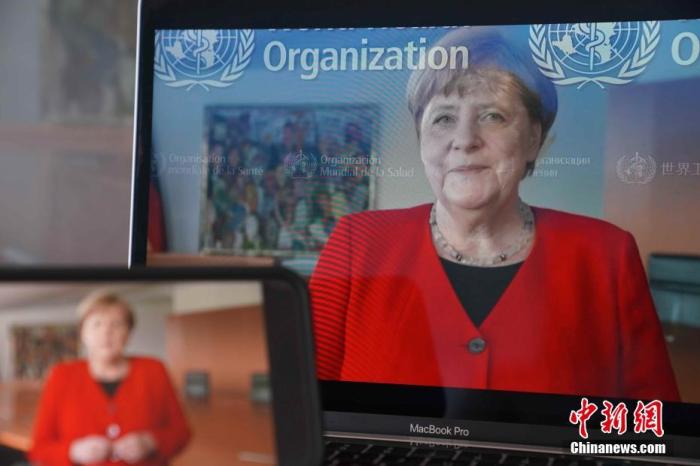China News Agency, Berlin, March 14 (Reporter Peng Dawei) On the 14th, Germany's "Super Election Year" started its first battle.
The exit polls that night showed that the Green Party and the Social Democratic Party ranked first in the two states in the state legislative elections held on the same day in the states of Baden-Württemberg and Lai Fah.
German Chancellor Merkel’s party, the CDU’s votes in the two states fell sharply. German media described this as the “worst record in history” of the CDU in local elections.
Data map: A remote speech by German Chancellor Merkel taken in Berlin, Germany.
Photo by China News Agency reporter Peng Dawei
As of 22:22 local time on the 14th, a German TV outlet poll showed that the top three political parties in Baden-Württemberg and Lai Fah were the Green Party (32.7%) and the CDU (23.8%). , Social Democratic Party (11.2%) and Social Democratic Party (36%), CDU (26.9%), Green Party (9.4%).
Among them, the Green Party of the governor of Baden-Württemberg has an increase of 2.4 percentage points in the state's votes compared with the previous election; the Social Democratic Party of the governor of Lafa has remained basically unchanged, only a slight drop of 0.2 percentage points.
The CDU is generally regarded as the biggest “loser” in the local elections in the two states: its vote rate in Bavaria has dropped by 3.2 percentage points, and in Lafayette it has fallen by 4.9 percentage points.
The multiple scandals exposed before the election are considered to be the direct fuse that affected the CDU election.
In early March, two members of the CDU and its sister party CSU in the Bundestag were suspected of profiting by introducing mask suppliers to federal government departments and local governments. They resigned due to pressure from all parties.
Another CDU member, Hauptman, also resigned because he was involved in an improper profit scandal.
However, some analysis also pointed out that on the one hand, the Federal Minister of Health of the CDU has repeatedly questioned the anti-epidemic performance of the Federal Minister of Health since last year. On the other hand, in recent years, as environmental issues have attracted more attention from the German people, the Green Party has taken advantage of the rise. These factors constituted the deep-seated reasons for the CDU’s first setback in the "super election year".
Next, Germany will hold local elections in four states, as well as general elections in late September.
For the CDU, which has been in charge of the prime minister for 16 consecutive years, how to use the remaining six months to regroup will be an urgent issue facing it.
The Secretary-General of the CDU Zimiyak said that day that the misconduct of individual congressmen has caused the party to be questioned, and at this time it should be more rectified.
He emphasized that the Coalition Party (a party group formed by the CDU and CSU) implements a policy of zero tolerance for corruption.
Zimiak also said frankly that the German public's dissatisfaction and misunderstanding of crisis management under the new crown epidemic are increasing. "Therefore, all relevant responsible persons must seriously explore how we can better, more pragmatically and quickly respond to the epidemic. ".
The results of the election that day inspired the current German Deputy Chancellor and Finance Minister Schultz, who is a member of the Social Democratic Party.
He, who will represent the party for the next prime minister, said that the results of the elections in Lafa state show that it is still possible to form a government without the CDU.
"I hope to become Chancellor of Germany. Today's situation shows that this is achievable." (End)

